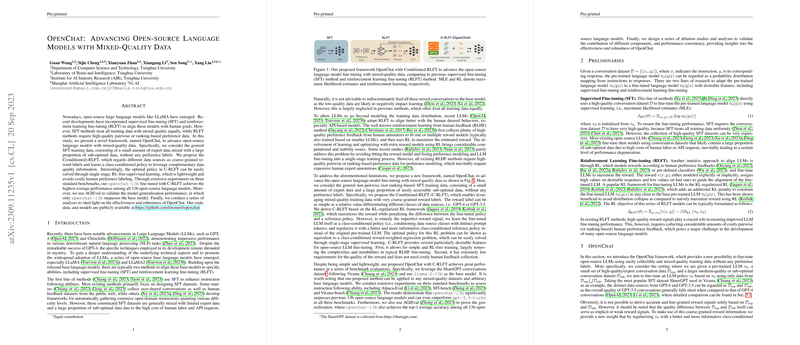Advancing Open-source LLMs with Mixed-Quality Data: A Review of OpenChat
The paper "OpenChat: Advancing Open-source LLMs with Mixed-Quality Data" discusses an innovative approach to enhance the performance of open-source LLMs, specifically targeting scenarios where training data is of mixed quality. The authors introduce OpenChat, emphasizing a new framework called Conditioned-Reinforcement Learning Fine-tuning (C-RLFT) to effectively utilize mixed-quality datasets without the necessity of fine-grained preference labels.
Key Contributions and Methods
Problem Scope
The primary issue addressed by the paper is the prevalent challenge in supervised fine-tuning (SFT) methods, which indiscriminately treat all training data equally. This is problematic because datasets often contain both high-quality and sub-optimal data. On the other hand, reinforcement learning fine-tuning (RLFT) methods typically require high-quality, pairwise, or ranking-based preference data, which is expensive to gather. The authors seek to bridge this gap by proposing a novel approach that can leverage mixed-quality data effectively.
Conditioned-RLFT Framework
The proposed C-RLFT framework innovatively resolves limitations by introducing a class-conditioned policy that distinguishes data sources based on coarse-grained reward labels. Here's a detailed overview of this method:
- Class-Conditioned Dataset and Rewards:
- The authors classify the data into expert data and sub-optimal data, encoding rewards of 1 for expert and a lower value (α < 1) for sub-optimal data.
- Policy Optimization:
- The conditioned policy incorporates data source information as an additional dimension, optimizing the model based on a KL-regularized RL framework. This novel approach substitutes traditional base model regularization with a class-conditioned reference policy, significantly enhancing the quality differentiation.
- Model Inference:
- During inference, the OpenChat model utilizes specific prompts used in high-quality data training, ensuring the generation of high-quality responses aligned with expert data patterns.
Experimental Validation and Implications
The authors validated OpenChat on several benchmarks, including AlpacaEval, MT-bench, and Vicuna-bench for instruction-following abilities, and AGIEval to assess model generalization. The OpenChat-13b model consistently demonstrated superior performance:
- AlpacaEval and MT-bench:
- OpenChat-13b achieved the highest win rate among all 13b open-source models, outperforming even gpt-3.5-turbo in several instances.
- AGIEval:
- The model surpassed base llama-2-13b in generalization tasks, indicating robustness against overfitting and maintaining accuracy across diverse tasks.
These results are significant as they illustrate that the OpenChat framework can effectively utilize mixed-quality datasets, offering practical benchmarks for the deployment of LLMs in varied applications where data quality is not uniformly high.
Future Directions
The paper opens several avenues for future research:
- Fine-grained Reward Tuning:
- While the coarse-grained reward system used in OpenChat is efficient, exploring more nuanced reward structures could further improve model performance.
- Extended Applications:
- Extending the C-RLFT framework to enhance reasoning abilities alongside instruction-following capabilities could broaden the practical applications of LLMs in complex task scenarios.
- Data Source Quality Metrics:
- Developing metrics to better quantify and utilize the quality of data sources could improve the robustness of models trained on mixed-quality datasets.
Conclusion
The authors of "OpenChat: Advancing Open-source LLMs with Mixed-Quality Data" present a compelling framework to address inherent challenges in training LLMs with heterogeneous data quality. Their approach leverages class-conditioned policies and a novel reward optimization strategy to achieve superior performance and robustness. This work represents a significant contribution to the field of AI, offering a practical, effective solution for enhancing the capabilities of open-source LLMs. As AI continues to evolve, the principles and methodologies introduced in this paper will likely inspire further innovations and applications.
